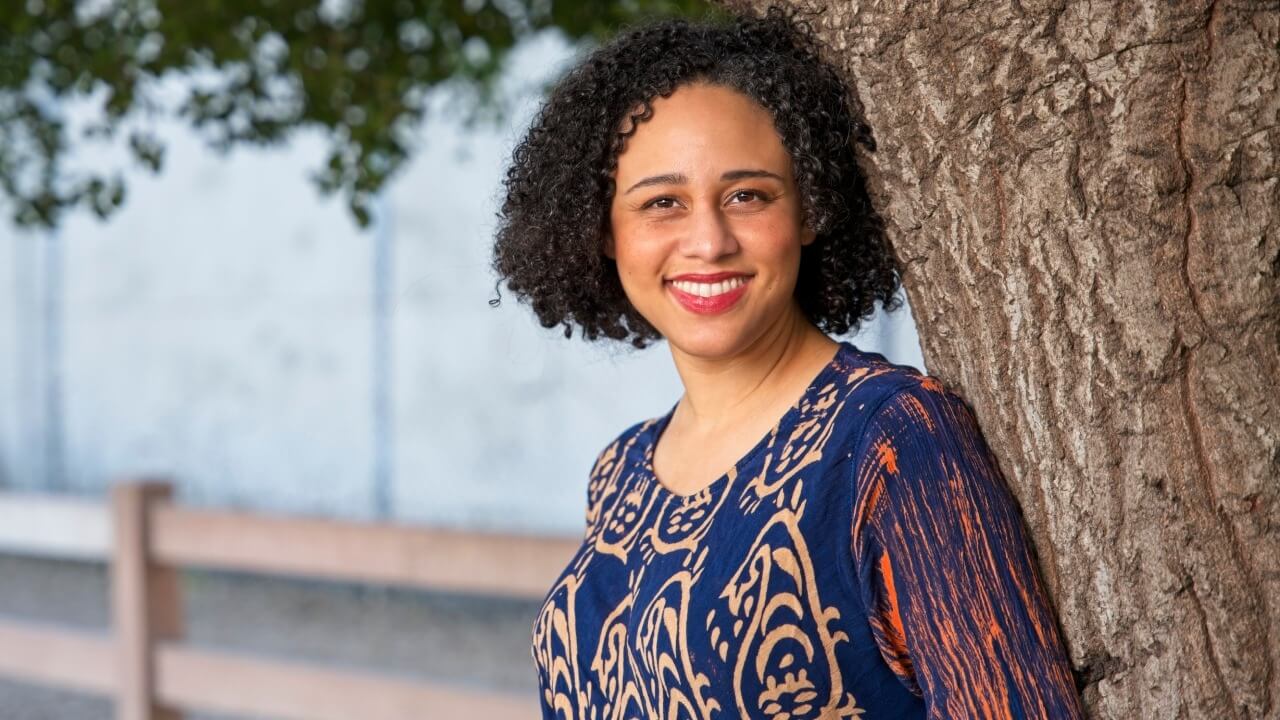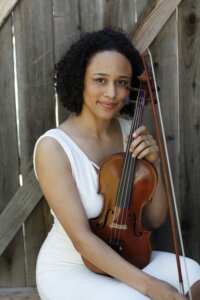Jenni Asher is set to become first ordained Black woman cantor
Asher will be one of only two Black cantors in the country

Jenni Asher Photo by Arjun Ramesh
(J. Jewish News of Northern California via JTA) — As a student at London’s Royal Academy of Music in the late 2000s, Jenni Asher lived across the street from the city’s Central Synagogue. She was not Jewish at the time, but she was feeling angst over the direction that her spiritual home, the Worldwide Church of God, was headed. So after church services, which were held on Saturdays, she sat in on Shabbat services at the grand Orthodox synagogue.
“It was really quite the introduction to Judaism, looking back at it,” she said in an interview. “I started learning Hebrew there.”
Today, the accomplished violinist is a cantorial soloist and a student at the non-denominational Academy for Jewish Religion California in Los Angeles. When she graduates next year, she will become the first Black American woman ordained as a cantor — and one of only two Black cantors in the country, according to the other one, Cantor David Fair.
“It will be a big moment,” said Fair, who was ordained at the Reform movement’s Hebrew Union College in New York in 2021 and works at Temple Emanuel in Grand Rapids, Michigan. “There are only a handful” of Black clergy leading synagogues in the United States, he added.
Fair noted that earlier Black performers who took the title “cantor” — figures such as Willie “The Lion” Smith, Thomas LaRue and Goldye Steiner — were not formally ordained. Some were not even Jewish by traditional standards.
“As trailblazing and courageous as they were, they were not actual cantors, just like you wouldn’t call a prolific Jewish thought leader a ‘rabbi’ if they didn’t get semicha,” Hebrew for ordination, said Fair, who wrote his HUC thesis on Black Jewish musicians.
Asher and Fair met at an American Conference of Cantors gathering in 2022, and Asher has called him for advice about how to navigate the Jewish world as a person of color in a leadership role.
“You will have to find compassion, and you will have to find opportunities for education that your white counterparts will never have to,” he said. “But you can still find the joy in that. I do believe it pays off in the end.”
Asher, 37, said she is up to the challenge. “My job as a Jew is to push myself to grow, and my job as a clergyperson is to invite others to grow, too,” she said.
Asher grew up in Pasadena, California, in a religiously devout and music-loving family. Her mother took her to the symphony at age 4 and asked her which instrument she wanted to play. She chose the violin. Her father, a singer, played all kinds of music in their home.
“My dad instilled a love of jazz in me and exposed me to a whole bunch of music I wouldn’t have otherwise heard,” she said.

By 12, Asher had played her violin so much that she developed tendonitis in her wrist. By the time she was in college, the tendonitis had spread down her arm. Doctors told her to stop playing. “I loved the violin too much to just stop, and I had to find a different answer,” she said.
An occupational therapist introduced her to myofascial release therapy, a bodywork approach that focuses on releasing specific points of tension. The therapy helped her recover, and Asher would go on to start her own myofascial release therapy practice.
“I started Musician Bodywork as a way of helping musicians understand their bodies and give them ways to maintain their career,” she said. “Musicians need a middle person between [the] doctor and them, someone who understands the fear of not being booked for gigs if you’re wearing a wrist brace.” She described the treatments as “like massage without oil.” (Due to her demanding schedule, she now refers potential clients to other therapists.)
As members of the Worldwide Church of God, which was later renamed Grace Communion International, Asher and her family observed the Sabbath on Saturday, avoided pork and shellfish and celebrated versions of Jewish holidays.
“I was brought up to think that I understood the Torah,” she said. “We appreciated the Jews because they could speak Hebrew and read the Bible in the original language.”
She eventually came to realize how much she didn’t know and decided to convert through American Jewish University, the Conservative movement institution that operates a robust conversion program. She converted again in the Sephardic Orthodox tradition in order to be able to fully participate at the synagogues favored by her husband, who has Egyptian Jewish and Mexican heritage.
“We sing Egyptian Jewish melodies around the Friday night dinner table that nobody else hears,” she said. Her family belongs to Kahal Joseph Congregation, a Mizrahi synagogue in Santa Monica that follows Baghdadi customs.
Her decision to enroll in cantorial school initially came from a desire to engage more fully with the liturgy. “I had so many musical questions that needed answers,” she said. “I wanted to be part of everything going on in the sanctuary and offer my strengths.”
Her favorite class at AJRCA is Jewish music history, which is taught by Cantor Jonathan Friedmann. “She is trying to build a place for instruments other than guitar in the sonic landscape of the American cantorate, which is refreshing and innovative and something I fully endorse,” Friedmann said. “I think she has the ability to breathe new life into the music of the synagogue.”
As a musician, Asher has performed with small ensembles and orchestras. She has released three albums of original arrangements and compositions: “London” (2014), “Freedom” (2017) and “Yaladati” (2021).
“Yaladati,” which means “I gave birth” in Hebrew, was a four-year project. “I was pregnant with my daughter when I started the album, and I finished it when I was pregnant with my son,” the mother of two said. “It was what I kept my creative self going with.”
The album contains 12 tracks, each with a Hebrew title — among them are “Savlanut” (“Patience”), “Isha” (“Woman”) and “Simcha” (“Joy”). Due to pandemic restrictions, she sang and played all of the instruments on the album — violin, viola, cello, erhu, double bass and piano — and also produced it.
Asher currently works as a cantorial soloist at Hamakom, a Conservative synagogue in Los Angeles. She hopes to continue serving the community, as music director and one of the cantors, after her ordination.
“It’s the perfect place to explore both older traditional melodies,” she said, “and to experiment with more musically improvisational services.”
This story originally appeared in J. Jewish News of Northern California and is reprinted with permission.
This article originally appeared on JTA.org.
A message from our Publisher & CEO Rachel Fishman Feddersen

I hope you appreciated this article. Before you go, I’d like to ask you to please support the Forward’s award-winning, nonprofit journalism so that we can be prepared for whatever news 2025 brings.
At a time when other newsrooms are closing or cutting back, the Forward has removed its paywall and invested additional resources to report on the ground from Israel and around the U.S. on the impact of the war, rising antisemitism and polarized discourse.
Readers like you make it all possible. Support our work by becoming a Forward Member and connect with our journalism and your community.
— Rachel Fishman Feddersen, Publisher and CEO




























